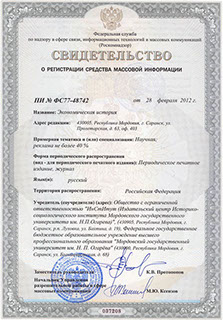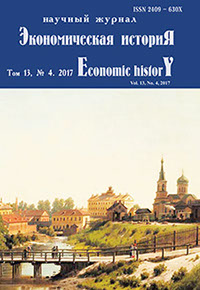Экономическая историЯ
Russian Journal of Economic History
ISSN 2409-630X (Print)
ISSN 2618-916X (Online)
Expert board:
- Scientific Council of RAS on economic history;
- Research and Educational Center «The economic history of Central Russia and the Middle Volga region» of Ogarev Mordovia State University;
- Center of Economic History of Lomonosov Moscow State University
Navigation
Certificate of registration

УДК 339.923.524(4)”2000/2015”
DOI: 10.15507/2409–630Х.039.013.201704.102–114
O. V. Bakhlova
National Research Ogarev Mordovia State University, Saransk, Russia, e-mail: olga.bahlova@gmail.com
ORCID http://orcid/org orcid.org/0000-0002-3849-8321
MANAGEMENT OF ECONOMIC INTEGRATION IN THE FRAMEWORK OF THE EURASEC AND THE EURASIAN ECONOMIC UNION: INSTITUTIONAL DYNAMICS 2000–2015
The article is devoted to problems of institutional dynamics in the framework of the Eurasian economic community and the Eurasian economic Union in the period 2000–2015 the aim of the study was to determine the nature of institutional development and the degree of continuity in the context of changing conditions and needs of managing economic integration in the post-Soviet space taking into account the interests of the Russian Federation. Objectives of the study requires the analysis of the provisions of the constitutive acts of integration and additional documents thereto, a comparative description of the institutional structure of the EurAsEC and the Eurasian economic Union, identifying the main factors of its evolution and prospects for the promotion of a supranational model of governance in these integration associations.
The study is based on the methods of comparative, systemic, institutional and historical analysis, political diagnosis. As the substrate of the studied object is a regulatory issue, regulatory and functional requirements and relationships in the EEC and the EAEC. In this problem field, the focus is on the identification and assessment of existing and potential institutional changes.
The results of the study showed insufficient level of implementation of supranational models of governance in the EEU. The article analyses approaches and opinions of local experts (M. Golovnin, M. Strezhneva, D. Ushkalova, etc.) regarding the problems and potential institutional development in the framework of the Union. The tendencies and factors of dynamics of the institutional structure of the EurAsEC and the Eurasian Economic Union, shows its General and special features. The main conclusion is the recognition of the need for adjustment mechanisms the adoption of integrated solutions and the promotion of socio-political institutional agents modeling in the direction of extension of the support of the Eurasian integration process.
Keywords: integration policy, Institute, the post-Soviet space, management, economic integration.
For citation: O. V. Bakhlova. Management of Economic Integration in the Framework of the EurAsEC and the Eurasian Economic Union: Institutional Dynamics 2000–2015. Jekonomicheskaja istorija = Economic history. 2017. 13(4). Р. 102–114.
© Ogarev Mordovia State University. History and Sociology Institute, 2017
68, Of. 411, Bolshevistskaya St., 430005, The editorial office of the scholarly journal «Russian Journal of Economic History»
Tel.: (8342) 24-25-90; 27-07-11, Fax: (8342) 24-25-90, E-mail: jurnal-econom-hist@isi.mrsu.ru
Designed by A. Napalkov, Email: napalkov@isi.mrsu.ru

